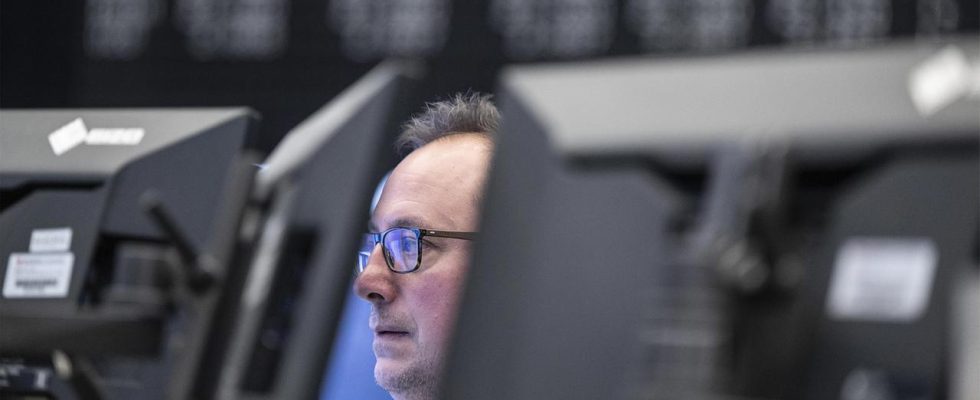market report
The stock markets remain heavily burdened given the situation in the Middle East. The DAX is unlikely to begin a recovery movement today either. Investors avoid risk and do not take on new commitments.
The leading German index is likely to start XETRA trading at 14,700 points, as pre-market indications suggest this in the morning. The crisis in the Middle East continues to impact the financial markets; there is currently no sign of the conflict easing. Yesterday, after nervous trading, the DAX recorded a small increase of 0.2 percent to 14,717 points.
The specifications from overseas are inconsistent in the morning. After a weak second half of October so far, the Dow Jones index in the USA recovered surprisingly significantly in the evening by 1.6 percent to 32,929 points. The market-wide S&P 500 gained 1.2 percent to 4,167 points. The Nasdaq 100, which is predominantly made up of technology stocks, rose by 1.1 percent to 14,336 points. Investors apparently welcomed the fact that Israel’s military advance in the Gaza Strip was more limited than expected, said Pierre Veyret, analyst at broker Activtrades. However, given the tense geopolitical situation, the mood could quickly change again.
The price fluctuations in Asia were significantly smaller. The Japanese Nikkei index gained 0.5 percent to 30,859 points. The markets reacted positively to the Japanese central bank’s decision to stick to its loose monetary policy. The Bank of Japan (BoJ) decided to make its yield curve control program even more flexible. In its second adjustment in three months, the central bank decided to use 1.0 percent as the new reference point for 10-year Treasury yields. The central bankers dropped the previous requirement that yields should fluctuate by plus or minus 0.5 percent.
The Shanghai stock exchange, on the other hand, was down 0.5 percent. The index of major companies in Shanghai and Shenzhen lost 0.7 percent. It was previously known that the mood in China’s large and state-owned industrial companies fell significantly again in October. As the Beijing Statistics Office announced today, the Purchasing Managers’ Index (PMI) for the manufacturing sector fell from 50.2 to 49.5 points compared to the previous month.
Investors are also currently waiting for a decision from the US Federal Reserve, which is due tomorrow. Investors are hoping that the Fed will pause interest rates again given the recent weak economic data. The monetary authorities are trying to curb inflation by raising interest rates without strangling the economy.
On the foreign exchange market, the euro continued to hover around the $1.06 mark. The European common currency continues to move in the narrow trade corridor of the past few days. On the raw materials market, prices stabilized in the morning after the slight decline from the previous day. A barrel of North Sea Brent costs $86.65 this morning. Fears of an escalation of the conflict between Israel and Hamas drove up prices by a good three percent on Friday. The price of a troy ounce of gold is $1,993.
In the DAX, Siemens Energy shares are likely to continue to attract investors’ attention. After the share price collapse last week, the stock recovered by 13 percent yesterday. According to media reports, the federal government is urging major shareholder Siemens to provide billions in support. In return, the federal government is prepared to grant loan guarantees worth eight billion euros, the Bloomberg news agency reported.
The DAX group Qiagen continues to struggle with the decline in demand for corona tests. In the third quarter, sales fell by five percent to $476 million, as the company announced in the evening. At constant exchange rates, sales were $470 million – more than the last forecast of at least $465 million. Qiagen benefited from five percent growth in non-Covid products. The bottom line is that consolidated earnings also fell by six percent to 78 million euros.
Lower prices and a significant decline in demand are weighing on BASF. From July to September, the adjusted operating result (EBIT) fell by a good 57 percent to 575 million euros. Analysts on average had expected 601 million. Sales fell by more than 28 percent to 15.7 billion euros. The bottom line is that BASF posted a loss of 249 million euros after a profit of 909 million euros a year ago, also due to burdens associated with its investment in the oil and gas company Wintershall Dea. After a slump in the third quarter, the chemical company now expects sales and earnings to be at the lower end of the previous forecast range.
The Duisburg steel trader Klöckner & Co from the SDAX is suffering from the poor economy and lower steel prices in Europe. For the current year, they only expect an adjusted operating result (Ebitda) of 170 to 200 million euros instead of the previously expected 220 to 280 million, the company said yesterday after the stock market closed. In the previous year, Klöckner & Co earned significantly more, at 417 million euros. To counteract this, around ten percent of jobs in the European steel trading business are to be cut.
According to media reports, Elon Musk’s online platform When shares were allocated to employees, X was valued at a total of $19 billion, wrote yesterday, among others, Fortune magazine and the Bloomberg news agency. Musk paid around $44 billion for Twitter in October 2022. The platform has suffered a significant decline in advertising revenue since the takeover.

